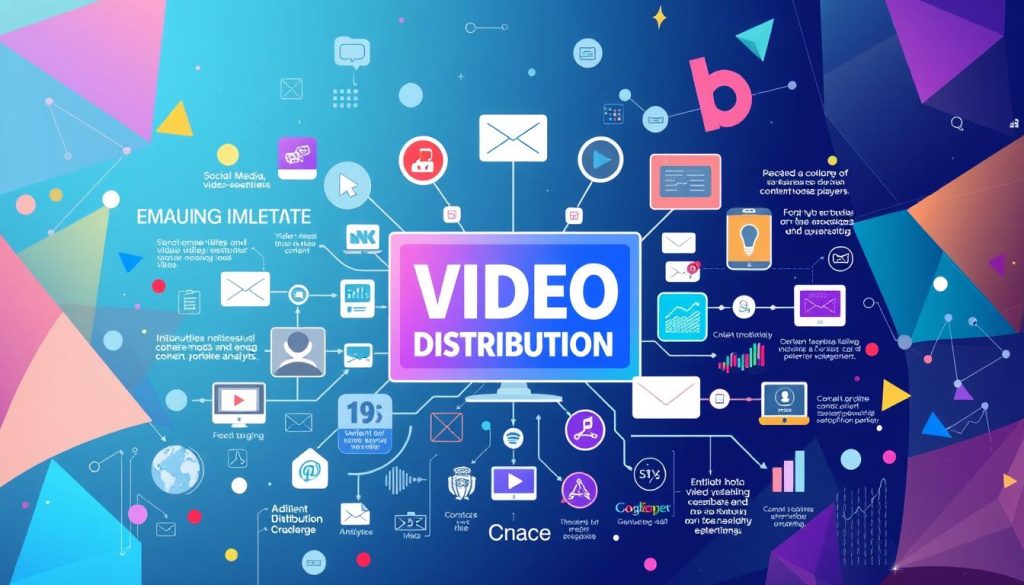Are you wondering how top brands manage to captivate their audience and stay ahead in the digital game? The secret lies in a powerful tool: video content marketing. In today’s fast-paced digital landscape, engaging your audience has never been more challenging—or more crucial.
With the rise of digital platforms, a well-crafted video marketing strategy can significantly elevate your brand’s visibility and engagement. It’s not just about creating videos; it’s about creating content that resonates with your audience and drives results.
Key Takeaways
Table of Contents
- Understand the importance of video content marketing in the digital age.
- Learn how to develop a compelling video marketing strategy.
- Discover the benefits of using video content for brand elevation.
- Explore effective ways to engage your audience through video.
- Gain insights into measuring the success of your video marketing efforts.
The Power of Video in Today’s Digital Landscape
With the rise of digital media, video has emerged as a powerful tool for brands to connect with their target audience and drive engagement. This shift towards video content is driven by its ability to convey complex information in an easily digestible format.
Why Video Dominates Consumer Attention
Video content dominates consumer attention due to its engaging nature. Here are some key reasons:
- Immersive Experience: Videos provide an immersive experience, combining visuals, audio, and storytelling to captivate audiences.
- Easy Consumption: Videos are easy to consume, allowing viewers to quickly grasp information without having to read lengthy text.
- Emotional Connection: Videos can create an emotional connection with viewers, making the content more memorable.
Key Benefits for Brand Growth and Recognition
The benefits of video content for brand growth and recognition are numerous:
- Increased Engagement: Videos increase engagement by providing a more interactive experience.
- Improved Brand Recall: The memorable nature of video content improves brand recall.
- Enhanced Credibility: High-quality videos can enhance a brand’s credibility and professionalism.
By leveraging online video promotion and digital video advertising strategies, brands can maximize their reach and impact, ultimately driving growth through effective video content creation.
Developing Your Video Content Marketing Strategy
Crafting a successful video content marketing strategy requires a deep understanding of your audience and goals. This foundational step is crucial for creating content that resonates with viewers and drives meaningful engagement.
Identifying Your Target Audience and Setting Clear Goals
Understanding your target audience is pivotal. This involves analyzing demographics, preferences, and behaviors to create buyer personas. Setting clear goals is equally important, as it helps in measuring the success of your video marketing efforts. Whether your goal is to increase brand awareness, generate leads, or drive sales, having a clear direction will guide your content creation process.
- Analyze your existing customer base to identify patterns and preferences.
- Conduct market research to understand your audience’s needs and pain points.
- Set SMART (Specific, Measurable, Achievable, Relevant, Time-bound) goals for your video marketing campaigns.
Choosing the Right Video Formats for Your Brand
The type of video content you create should align with your brand’s message and audience preferences. Different formats serve different purposes, and choosing the right one is crucial for engagement.
Short-form Videos for Social Media
Short-form videos are ideal for social media platforms, where attention spans are short. They are perfect for capturing quick moments, showcasing products, or sharing customer testimonials.
Long-form Content for In-depth Engagement
Long-form content, such as webinars, tutorials, and explainer videos, provides an opportunity for more in-depth engagement. It’s suitable for complex topics that require detailed explanations.
Live Videos for Real-time Connection
Live videos offer a unique chance to connect with your audience in real-time. They are excellent for events, product launches, and Q&A sessions, fostering a sense of immediacy and community.

Creating a Content Calendar for Consistent Production
A content calendar is essential for organizing and scheduling your video content in advance. It ensures consistency, reduces last-minute rushes, and helps in planning content around key events or product launches.
“A content calendar is not just a schedule; it’s a strategic tool that helps in maintaining a consistent brand voice and message across all your video content.”
By following these steps and tailoring your video content marketing strategy to your audience’s needs and your brand’s goals, you can significantly enhance your brand’s visibility and engagement.
Video Production Essentials for Effective Marketing
To elevate your brand through video marketing, understanding the essentials of video production is crucial. High-quality video content can captivate audiences, convey complex information simply, and leave a lasting impression on viewers.
Effective video production involves several key components, including the right equipment, engaging scriptwriting, meticulous storyboarding, and skilled editing. Each of these elements plays a vital role in creating a compelling video that resonates with your target audience.
Equipment and Software Recommendations for Different Budgets
Investing in the right equipment and software is fundamental to producing high-quality video content. The good news is that you don’t need a Hollywood budget to create professional-looking videos.
Entry-level Solutions for Beginners
For those just starting out, smartphones with good cameras and basic editing apps like iMovie or Adobe Premiere Rush can be a great starting point. These tools allow you to create and edit videos without a significant upfront investment.
Professional Setups for Growing Brands
As your brand grows, so can your video production capabilities. Investing in a DSLR camera, external microphones, and professional editing software like Adobe Premiere Pro or Final Cut Pro can significantly enhance your video quality.
| Budget Level | Camera | Microphone | Editing Software |
|---|---|---|---|
| Entry-Level | Smartphone | Built-in or Basic External | iMovie, Adobe Premiere Rush |
| Professional | DSLR or Mirrorless | External Microphone (e.g., Rode NTG4) | Adobe Premiere Pro, Final Cut Pro |
Scriptwriting and Storyboarding Techniques
Engaging video content starts with a well-written script and a clear storyboard. Your script should be concise, informative, and tailored to your audience’s interests.
Storyboarding helps visualize the sequence of events and shots, ensuring your video flows logically and keeps viewers engaged. It’s a crucial step that can save time and resources during production.
Editing Tips to Enhance Viewer Engagement
Editing is where your video comes together. To enhance viewer engagement, focus on pace, visual effects, and audio quality. Cutting unnecessary scenes, adding relevant transitions, and ensuring crisp audio can make your video more compelling.
By focusing on these video production essentials, you can create effective marketing videos that capture your audience’s attention and elevate your brand.
Maximizing Video Distribution and Promotion Strategies
In today’s digital landscape, maximizing video distribution and promotion strategies is vital for brand visibility. With the ever-increasing amount of video content being uploaded daily, it’s crucial to have a solid plan in place to ensure your videos reach your target audience.

Platform-Specific Optimization Techniques
Different platforms have different requirements and audience behaviors. Optimizing your video content for each platform is key to maximizing its reach and engagement.
YouTube SEO Best Practices
YouTube is the second-largest search engine in the world. To optimize your videos on YouTube, focus on keyword research for your titles and descriptions, use relevant tags, and create eye-catching thumbnails.
Social Media Video Campaigns
For social media platforms like Facebook, Instagram, and Twitter, the key is to create engaging, short-form content that resonates with your audience. Utilize features like stories, reels, and live streaming to diversify your content.
Website and Email Integration
Embedding videos on your website can improve user experience and increase dwell time. Similarly, incorporating videos into your email marketing campaigns can boost click-through rates and engagement. Ensure that your videos are mobile-friendly and have clear calls-to-action.
Video SEO Techniques for Greater Visibility
Video SEO is crucial for increasing your video’s visibility on search engines. Some effective techniques include using transcripts for your videos, optimizing your video titles and descriptions with relevant keywords, and building high-quality backlinks to your video content.
- Use keyword-rich titles and descriptions.
- Optimize your video thumbnails.
- Utilize video transcripts and closed captions.
- Promote your videos on multiple platforms.
Measuring Video Engagement Metrics and ROI
To understand the effectiveness of your video marketing efforts, it’s essential to measure engagement metrics and ROI. Key metrics to track include view count, watch time, engagement rate, and conversion rate. Use analytics tools to gather data and make informed decisions to optimize your video content strategy.
- Track view count and watch time.
- Analyze engagement metrics like likes, comments, and shares.
- Monitor conversion rates and ROI.
- Adjust your strategy based on analytics insights.
Conclusion: Elevating Your Brand Through Strategic Video Marketing
As we’ve explored throughout this article, video content marketing has become a crucial element in today’s digital landscape. By understanding the power of video and developing a strategic video marketing strategy, brands can significantly elevate their presence and engagement.
To stay ahead, it’s essential to keep up with the latest video marketing trends and incorporate them into your overall video content marketing plan. This includes creating high-quality, engaging content that resonates with your target audience and leveraging the right distribution channels to maximize your reach.
By implementing the techniques discussed, such as optimizing your videos for different platforms and measuring your video engagement metrics, you can refine your video marketing strategy to achieve greater ROI. The key is to remain consistent, adapt to changes in the market, and continually assess and improve your approach to video content marketing.
With a well-planned video marketing strategy, you can drive meaningful results for your brand, enhancing both growth and recognition. Start leveraging the power of video today to take your brand to the next level.
FAQ
What is video content marketing, and how can it elevate my brand?
Video content marketing is a strategy that involves creating and distributing valuable, relevant, and consistent video content to attract and retain a clearly defined audience. It can elevate your brand by increasing visibility, engagement, and conversion rates.
How do I develop a video content marketing strategy that works for my brand?
To develop a successful video content marketing strategy, identify your target audience, set clear goals, choose the right video formats, and create a content calendar. This will help you produce consistent, high-quality content that resonates with your audience.
What are the best video formats for my brand, and how do I choose them?
The best video formats for your brand depend on your goals, audience, and distribution channels. Consider using short-form videos for social media, long-form content for in-depth engagement, and live videos for real-time connection. Experiment with different formats to find what works best for your brand.
How can I optimize my videos for different platforms, such as YouTube and social media?
To optimize your videos for different platforms, use platform-specific optimization techniques, such as YouTube SEO best practices, social media video campaigns, and website and email integration. This will help increase your video’s visibility and reach a wider audience.
What are some effective video SEO techniques to improve my video’s visibility?
Effective video SEO techniques include using relevant keywords, optimizing video titles and descriptions, and creating high-quality, engaging content. You can also use video SEO tools to analyze your video’s performance and make data-driven decisions.
How do I measure the success of my video content marketing efforts?
To measure the success of your video content marketing efforts, track video engagement metrics, such as views, likes, comments, and shares. You can also use analytics tools to measure ROI and adjust your strategy accordingly.
What are some common mistakes to avoid in video content marketing?
Common mistakes to avoid in video content marketing include producing low-quality content, neglecting to optimize for different platforms, and failing to measure and analyze performance. By avoiding these mistakes, you can create a successful video content marketing strategy that drives results.

